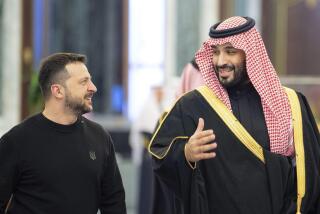Jordan’s king breaks the Sunni Arab ice with Iraq
BAGHDAD — Iraq’s drive to forge ties with Sunni-led Arab neighbors, who it says have shunned its Shiite Muslim leadership, got a boost Monday when Jordan’s King Abdullah II became the first leader of an Arab nation to visit since the fall of Saddam Hussein.
The visit is the latest in a series of moves by Arab states that Iraqi and U.S. officials say could improve security and counter the influence of Shiite-led Iran, a player here in economic, diplomatic and security matters.
The circumstances of the visit were in stark contrast to those surrounding a trip here in March by Iranian President Mahmoud Ahmadinejad. Abdullah’s visit was not announced in advance, there were no public appearances, and he stayed just a few hours. Ahmadinejad’s arrival was trumpeted well in advance. He received a red-carpet welcome, made several public appearances and was in Iraq for two days.
The United States accuses Iran of fomenting unrest in neighboring Iraq by aiding and training Shiite militias. Both Washington and Baghdad have said that if Sunni-led states in the region had more of a presence in Iraq, that could temper Iran’s clout.
But Arab countries have not had a good reception here. An Egyptian envoy was kidnapped and killed shortly after arriving in 2005 to represent his country. The Jordanian Embassy in Baghdad was bombed in August 2003.
Iraqi Foreign Minister Hoshyar Zebari called Abdullah’s visit a bold step and said he hoped other Arab nations would follow suit.
“The visit was short, however with a great political significance. It was a historic visit, in my opinion,” Zebari told Iraqi television.
Zebari said Abdullah’s arrival showed that Arab nations were recognizing that Iraq is “starting to rise again.”
U.S. Embassy spokeswoman Mirembe Nantongo called Abdullah’s visit “a positive sign reflecting improving conditions in Iraq.” She said Washington hoped it would spur other Arab and world leaders to visit Iraq, send ambassadors here and step up cooperation with the country.
Jordan, Kuwait and the United Arab Emirates are the only Sunni Arab states to name ambassadors to Iraq since the 2003 ouster of Hussein, whose Sunni dictatorship repressed Iraq’s Shiite majority. Kuwait and the UAE named their ambassadors in the last two months.
A statement from Iraqi Prime Minister Nouri Maliki’s office said he hoped the visit would lead to closer relations between his nation and other regional states and improve security.
Iraqi and U.S. officials say many of the foreign Sunni insurgents recruited by the militant group Al Qaeda in Iraq have entered via neighboring Sunni states, and they have pressed those countries to improve border controls.
The insurgent group’s influence has diminished in recent months, but it remains active. In Baqubah, the capital of Diyala province, police said a 15-year-old girl blew herself up inside a police station Monday with more than 20 pounds of explosives.
A U.S. military statement said one Iraqi policeman was killed, but earlier reports from Iraqi officials put the death toll at five.
On a road east of Baqubah, a roadside bomb killed five Iraqi women when it detonated near their vehicle. Diyala is a stronghold of Al Qaeda in Iraq, and the Iraqi military last month launched an offensive there against the insurgents. Previous military offensives led by U.S. troops have resulted in periods of calm, but violence tends to increase again as soon as insurgents chased from the region regroup.
On Monday, the Iraqi military said it was halting the latest offensive until Friday to give gunmen time to disarm.
--
Special correspondents in Diyala province contributed to this report.
More to Read
Sign up for Essential California
The most important California stories and recommendations in your inbox every morning.
You may occasionally receive promotional content from the Los Angeles Times.










